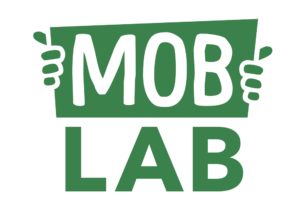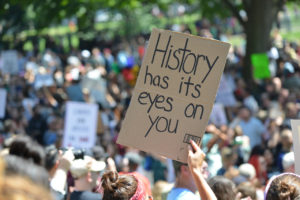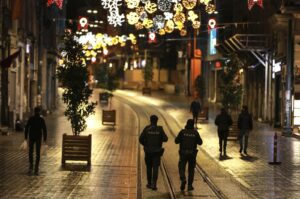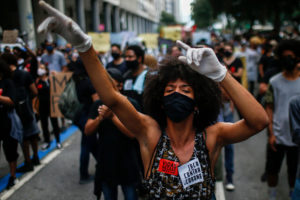“In Somali, when we see injustice, we say ‘dhiiga kuma dhaqaaqo?’ which translates into ‘does your blood not move?’ ” —- Warsan Shire
There are no words in the dictionary to describe what we are living. We are witness to a livestreamed genocide in front of our eyes. Amira Hass, an Israeli journalist and author says, “Revenge is not enough to describe this. Israel is carrying out a planned political program.”
In the midst of a siege upon Gaza and widespread Western state-sponsored support for Israeli retribution, the media wants us to believe solidarity isn’t taking place but it is – strong and growing, including Jewish, Black, indigenous, queer and trans comrades and from refugees and diasporas across the world. People are organizing and resisting genocide. We are not alone.
To honor the grief and organizing during this time, we will not be sharing a Jobs section in this Dispatch. We are sharing resources that we hope you will use to mobilize your networks, plan actions, and practice solidarity in community. We have an urgent collective responsibility to combat misinformation, change harmful narratives, and stop genocide – including occupation, apartheid, and settler-colonialism.
Omar Barghouti, a founder of the Boycott Divest Sanction (BDS) movement, writes, “Like many others, we Palestinians love and care. We fear, and we dare. We hope, and we sometimes despair. But above all, we aspire to live in a more just world, with no ranking of suffering, no hierarchy of human worth, and where everyone’s rights and human dignity are cherished and upheld.”
We’re not freeing Palestine. Palestine is freeing us. From indifference, respectability politics, hypocrisy, and Western double standards. Things will never be the same again.
From all of us at the MobLab Collective, in solidarity.
Issue primers:
Gaza is occupied under Israel’s control. Over the past 16 years, more than 2 million Palestinians in Gaza have been living under an illegal blockade. Across all areas under its control Israel imposes a cruel system of oppression and domination against Palestinians amounting to apartheid. The current total blockade of Gaza, denying Palestinians access to water, electricity, food, medical supplies and fuel is collective punishment, which is a war crime, as is the deliberate or indiscriminate attacks on civilians.
- Israel imposes a system of oppression and domination against Palestinians across all areas under its control: in Israel and the OPT, and against Palestinian refugees, in order to benefit Jewish Israelis. This amounts to apartheid as prohibited in international law. Laws, policies and practices which are intended to maintain a cruel system of control over Palestinians, have left them fragmented geographically and politically, frequently impoverished, and in a constant state of fear and insecurity. [Amnesty International]
- Sari Bashi from Human Rights Watch explains that international war obligations are nonreciprocal – one war crime does not excuse another. International humanitarian law prohibits punishing people for acts that they did not commit. In this case, punishing civilians in Gaza for the actions – amounting to war crimes – committed by Hamas. The Israeli blockade on Gaza is unlawful and deadly. “Israel has cut off the most basic goods necessary for survival in Gaza, where there are more than a million children at risk. Every hour that this blockade continues costs lives.” [The New Yorker, Human Rights Watch]
- Al Jazeera produced a short 15 minute documentary on how Israel was founded. [Al Jazeera]
- IMEU shares the answers to your basic questions about Gaza. [IMEU]
Movements and protests:

- October 20th, 2023 is declared a Global Strike for Palestine. “We call upon our network to join businesses, organizations, and schools around the world as they close on Friday, October 20th as they participate in a general strike in solidarity with Palestinians. This strike is a loud signal of the “indignation against the genocide in Gaza and the repressive state terror of many Western states against everyone who shows and acts in solidarity with the Palestinians. The Palestinian solidarity movement is hun systematically harassed and criminalized.”
- Omar Barghouti pens this op-ed on why the BDS movement has never been more important than now . The “Boycott Divest and Sanction” movement has been the most significant international solidarity movement of the 21st century and much of their campaigning has foreshadowed this moment. Barghouti shares, “The most profound ethical obligation in this time of carnage is to act to end complicity.” [The Guardian]
- Across the Middle East and North Africa, tens of thousands have taken to the streets to show their support for Palestine and demand an end to genocide and occupation. [Al Jazeera]
- On Thursday, October 12th, organizers with Palestine Action US took direct action against Israel’s largest weapons manufacturer, Elbit Systems, at its “Innovation Center” in Cambridge, Massachusetts. Activists blockaded Elbit’s main entrance so their employees could not enter, and drenched the building with red paint and graffiti, exposing Elbit for profiteering from Israeli war crimes against Palestinians. Elbit supplies Israel with 85% of their military drone fleet, along with bullets, tear gas, land-based equipment, and internationally banned weapons. [Mondo Weiss]
Misinformation and censorship:
We are witnessing in real time the collision of years of Western media misinformation, disinformation, and disinterest with years of education failures to appropriately contextualize imperialism and racism.
- This is how misinformation is being spread online – particularly through social media and unverified news. [The Guardian]
- Across France and Germany, the government and police have arrested protestors and banned mention of Palestine. [Reuters]
- Western universities are punishing students who are protesting against Israeli siege on Gaza – SOAS University of London has officially begun taking steps suspending its own students following a rally in solidarity with Gaza. NYU Law School student body president Ryna Workman was fired from their position and also had a job offer rescinded. [DAWN, The Intercept]
- Palestine Legal and 540+ legal community members in the US have released a letter urging elected officials and institutional leaders to take action to address surging racist attacks and unlawful retaliation against advocates for Palestinian rights. [Palestine Legal]
Framing:
We have reached out to friends, colleagues, and narrative networks to help share framing advice during this moment. We are sharing direct resources and stories of their experiences talking about this crisis. In general, it is important to know who you are talking to and your context.
- Jewish Voice for Peace has created ‘Gaza Talking Points’ which emphasize strong talking points to focus on values and vision of a future of liberation and equality for all, link to root causes, reality and history about Israeli violence and oppression, occupation and apartheid, and move people towards paths of action.It includes specific pointers on what to say when asked about Hamas and how to have hard conversations with family and friends, which is deeply necessary. [Jewish Voice for Peace]
- “A framing focusing on humanity, justice and humanitarian relief is important. Some caution that in this moment it might be strategic to focus on framing like “anti-genocide” or “anti-apartheid”. Many people around the world do not have a deep understanding of the Israel-Palestine conflict, but they do understand that ethnic cleansing, and genocide and apartheid are inherently human rights violations and acts against humanity.”
- “I have been clearly framing genocide/ethnic cleansing as a project by the Israeli government (system vs. people) supported by Western Imperialism (system vs. people) and have been amplifying intersectional solidarity from grassroots peace-building groups in Israel and Palestine to leave people with a long-term vision where peace is possible.”
- “Focusing on sharing messages for action paired with images that communicate the humanity of Palestinians (not images of atrocities). On my personal channels, I’ve also been providing historical context to help my friends and family not accidentally spread misinformation.”
- Bring humanity into the picture and tell stories of real people with real names and lives. Amnesty International researcher Budour Hassan explains in a powerful ABC interview that it is “striking how people in Gaza are treated as nameless and faceless masses”. Journalist Chris McGreal, who covered the Rwandan genocide as a reporter, says the language being used to describe Palestinians is genocidal. [ABC, The Guardian]
On grief and processing:
The grief and trauma of this moment will outlast us all. We will never be the same. And while Palestinians and their loved ones are undoubtedly more affected by an impending genocide, there is real grief that Jews and Israeli Jews are also experiencing. These emotions should not be weaponized into perpetuating state-sponsored genocide and ethnic cleansing, however. Here are some resources to help us process the grief and loss of these times, with the goal of preparing our hearts and minds to return to the work, because love and grief are two sides of the same coin. We must love a new world into being.
- The GEN Grief Toolkit, by Camille Sapara Barton in collaboration with Global Environments Network shares important resources on grief work, rituals and tools. It is important to have tools to work with our collective and cumulative grief in times where we can’t stay there for too long, because that paralysis leaves space for more danger towards us against unrelenting aggressive non- discriminatory fascism and oppression. [Global Diversity]
- The Crisis Handbook is a resource to help changemakers navigate crises and harness the power they hold to shift mindsets. The Handbook is made up of a deck of cards that guides you through designing impactful interventions at the different stages of a crisis. Each card contains a how-to, tools and examples. [Mindworks Lab]
- Migrants in Culture have developed a drawing kit with guided prompts and questions to help create space for reflection and resilience through drawing to sustain energy and work towards a free Palestine in our lifetime. [Migrants in Culture Twitter]






